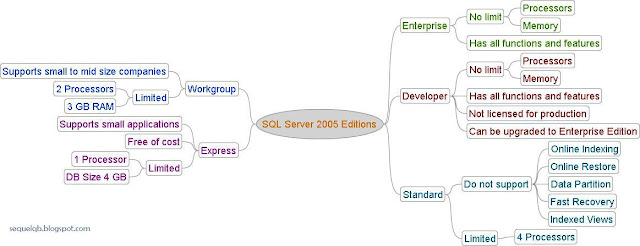Sunday, December 5, 2010
Simple Questions on SQL Server Editions
SQL Server 2005 installation requirements may differ depending on your application needs.
The different editions of SQL Server 2005 have the unique performance, price requirements and will suit for different scenarios. It is your responsibility to decide among editions of SQL Server 2005 before you install.
This image can help you understand how to make the best choice among the editions and components available in SQL Server 2005.
Questions:
1. Which of the following editions of SQL Server 2005 can support Indexed Views? Choose all that apply.
(A) Enterprise Edition
(B) Developer Edition
(C) Standard Edition
(D) Workgroup Edition
(E) Express Edition
2. You have given a Server with Windows 2003 operating system, 4 processors and 3 GB of RAM. What editions of SQL Server 2005 will you install on the server? Choose all that apply.
(A) Enterprise Edition
(B) Developer Edition
(C) Standard Edition
(D) Workgroup Edition
(E) Express Edition
3. Your customer requests you to develop a small web application to record walk-in interview details. Your will develop the application along with a small database and to be shipped to customer free of cost. Which edition of SQL Server 2005 will you choose?
(A) Enterprise Edition
(B) Developer Edition
(C) Standard Edition
(D) Workgroup Edition
(E) Express Edition
4. Which of the following editions of SQL Server 2005 NOT supported for use in a production environment?
(A) Enterprise Edition
(B) Developer Edition
(C) Standard Edition
(D) Workgroup Edition
(E) Express Edition
5. You have given a Server with Windows 2003 operating system with 8 processors. What editions of SQL Server 2005 will you install on the server that can utilize all the 8 processors?
(A) Enterprise Edition
(B) Developer Edition
(C) Standard Edition
(D) Workgroup Edition
(E) Express Edition
6. You suspect that a particular table can grow large and historical data may be archived. To do this you may implement table partitioning. Which of the following editions of SQL Server 2005 can support table partitioning?
(A) Enterprise Edition
(B) Developer Edition
(C) Standard Edition
(D) Workgroup Edition
(E) Express Edition
Show Answers:
Subscribe to:
Post Comments (Atom)

No comments:
Post a Comment